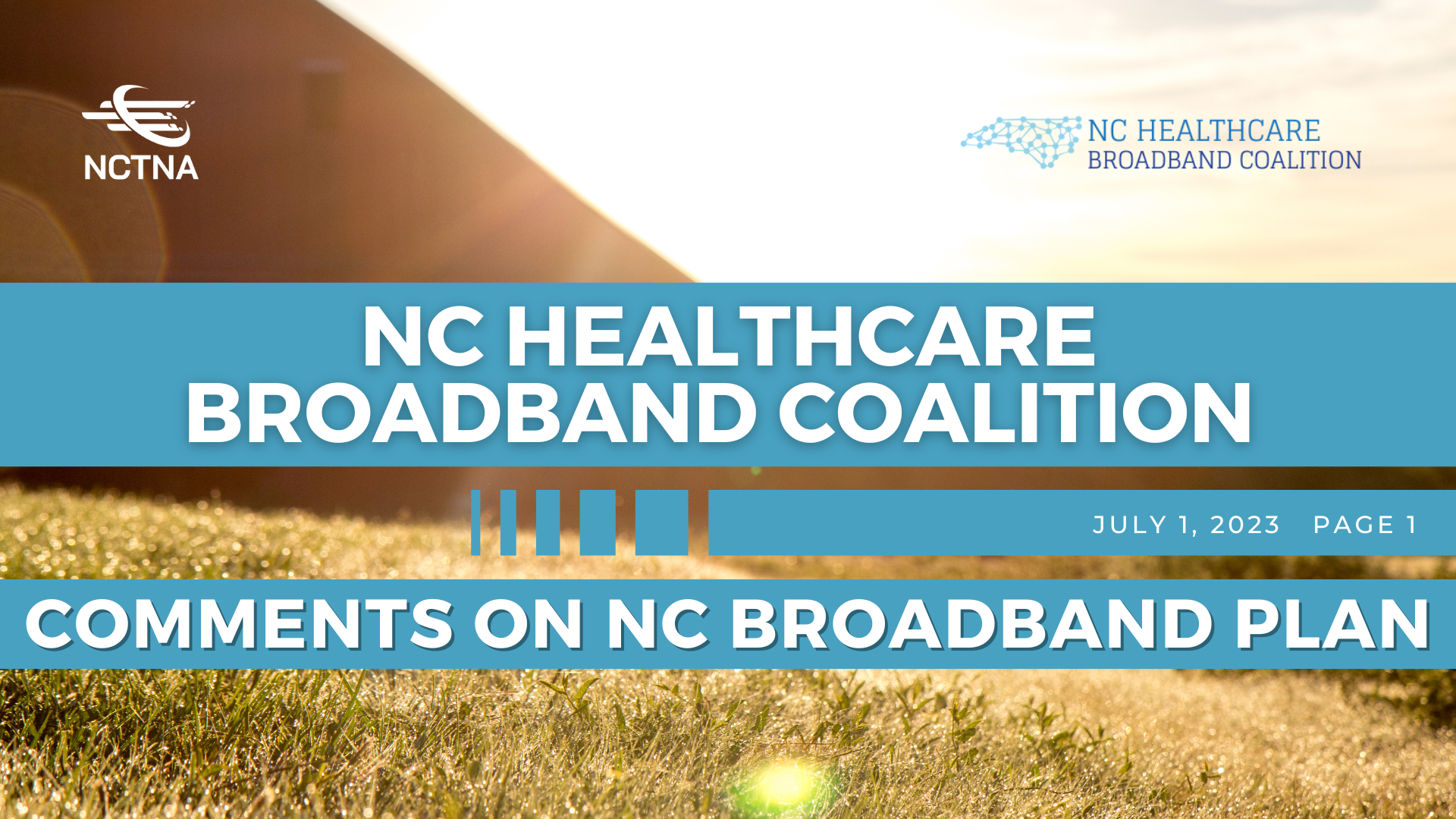NCHBC COMMENTS ON NC BROADBAND PLAN
JULY 2023
The North Carolina Healthcare Broadband Coalition (NCHBC) welcomes the opportunity to file these comments responding to the North Carolina Division of Broadband and Digital Equity draft of its State of NC BEAD Program Five-Year Plan. With these comments, the NCHBC supports positive, key aspects of the current version of the plan, and it also provides observations and recommendations intended to improve the current draft.
NCHBC believes that the plan’s reliance on the division’s existing broadband funding infrastructure and programs provides a reliable foundation, based on practice and experience, that gives the state a leg-up as it solicits funding requests and evaluates proposals, allocates funds, and monitors BEAD-related programs.
We also support the Division’s data-driven approach to decision-making. While the state has fared well with the overall allocation of funds to the state, the need is substantial, and preliminary estimates of the overall cost of the NC BEAD program suggest that funding will be tight. We will need to make our very best assessments of unserved, underserved, high-cost, and eligible anchor institution locations. Again, the existing state infrastructure in the NC Center for Geographic Information and Analysis and the NC Geographic Information Coordinating Council along with existing address-related data sets, and the mapping capabilities of the Division itself, all give the state a leg up in its efforts to drive decisions with good information. In addition, we support the division’s intention to leverage partnerships with the state’s broadband stakeholders for a number of reasons and in particular to help the division accurately identify locations of need and to solicit the participation of those without adequate broadband access.
NCHBC works with several broadband organizations around the country, and all have recognized the importance of policy and workforce to the successful rollout of the BEAD program. We are glad to see that the division does so as well and plans to identify and address policy issues and solutions as the state moves forward with its plans.
Finally, as a representative of the state’s healthcare and public health organizations, we appreciate the division’s recognition that healthcare is fundamentally dependent on broadband for its internal operations, information sharing among healthcare providers, and the practice of telehealth. This means that ultimately, the expansion of broadband promotes the expansion of access to high-quality healthcare. We appreciate the division’s recognition that healthcare organizations are important broadband stakeholders in North Carolina.
As we noted earlier, the NCHBC understands that policy and workforce-related issues could be a serious constraint in a successful BEAD rollout. We are concerned about legislation that restricts the role of rural municipalities as they attempt to enhance broadband access for their residents. We understand that pole attachment fees and easement access could make broadband roll out prohibitively expensive in many parts of North Carolina, and most importantly, a key barrier to adoption is affordability. North Carolina can run fiber to all unserved BSLs, and if the residents at the end of that fiber can’t afford the connection, we remain a digitally divided economy and state. We recommend that the division recognize this issue in the plan, that it specifically discusses the Affordable Connectivity Program, it’s importance, and the need to promote additional, sustainable funding alternatives. Preferably, it would also establish a commission or other policy initiative to explore, develop, and promote sustainable alternatives.
Similarly, North Carolina is participating in a massive build-out of broadband as are most other states. This collective effort will, of course, require a large, well-qualified workforce. Currently it appears that we are short of workers in North Carolina (and in most other states). The plan recognizes this shortfall, and it points to working with consultants and collaboration with the Department of Commerce as steps to take in increasing and strengthening the requisite workforce. However, the NCHBC believes the plan should be more detailed in its description of the potential problem and in the steps the division plans to take to address the expected shortfall. Again, we believe that this is an important issue and therefore should be highlighted in the plan.
Of course, anchor institutions play many important roles in their local communities. They can also play an important role in the successful execution of the BEAD and the Digital Equity programs, and we appreciate that the plan includes anchor institutions as community partners. We would recommend that the plan go beyond the simple identification of anchors as partners and elaborate on the actual and potential roles of anchor institutions.
As a representative of NC healthcare providers and given healthcare organizations and facilities are important local anchor institutions in most communities, the NCHBC suggests several possible roles for healthcare anchors. First, in line with data-driven decision-making, healthcare organizations can assist the Friday Institute, accelerating the collection of data about BSLs, requesting survey participation by staff (for rural counties, healthcare organizations are often the largest employers in their counties), patients, and residents, and more broadly leveraging existing health-related outreach programs. Healthcare providers can gather information on the health-related impact of broadband-related programs on their communities, including things like healthcare access, quality of care, and prevention, and healthcare anchors can work with the division and ISPs to accelerate the positive benefits of new broadband connectivity with such things as collaborative messaging to patients about ongoing and prospective telehealth services that will be available with coming broadband.
In line with the important community role of anchor institutions, NCHBC recommends that the plan also modify its definition of anchor institutions that are eligible for BEAD funding. Rather than describing eligible anchors as being those without fiber access, we recommend that the language be aligned with that of the original NTIA NOFO. Anchors without a gigabit connection will be eligible for funding. In addition, the FCC has assumed that no anchor institutions subscribe to mass market internet services. Thus, their facilities are not broadband serviceable locations (BSLs). As a result, they are not included on the National Broadband Map and are not eligible for funding. The NCHBC is aware of many healthcare facilities that do rely on mass-market services for internet connections. We, therefore, recommend that the plan reference this issue, will work to collect broadband-related data for anchor locations and that this data will be used to inform funding allocations.
Given the plan’s intention to engage communities through partnerships and that anchors can be impactful partners, we recommend that the division allocate dedicated staff time to the identification and recruitment of anchor partners, the clarification of potential anchor roles/contributions (both for BEAD and Digital Equity programs), and the tracking of anchor-related initiatives.
Finally, NCHBC supports the division’s efforts to align the plan with the work of other state agencies and, in particular, recommends that it explore the role of the Office of Rural Health as a partner in a range of planning and roll-out activities that are like those suggested for healthcare anchors, things like promoting mapping/survey participation by its rural providers, inventorying its providers computing assets that might be recycled, and ACP enrollment by patients.
The NCHBC believes the BEAD funding represents a watershed for North Carolina’s healthcare organizations and its patients. We believe the plan represents a solid first step in the state’s deployment of these funds, and we appreciate the opportunity to provide comments. We look forward to the plan’s next iteration.





